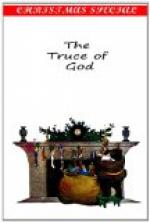Father Omehr’s duties increased as the fifteenth of October approached. The yeomen and vassals of Stramen recked little of their bodies, but they cared not to peril their souls. They feared not to expose their breasts to the arrow and lance, and to meet the powerful war-horse with unflinching spear; but they were solicitous, at the same time, to purify their hearts for the mortal struggle. This wise precaution indicates no craven spirit, for he who fears eternity the most, fears death the least. The good missionary beheld with a mournful eye the preparations everywhere making for a struggle apparently inevitable. He shared not in the ambition of Rodolph or the ardor of his barons; and he bitterly lamented the dire necessity which compelled blessed peace to disappear beneath the withering breath of war. Yet war seemed to be the unavoidable result of the excommunication, and the action of the Pope was necessary to preserve the purity and liberty of the Church. Deeply as he deplored the present crisis, he exclaimed, “Thy will, O God, be done! We have done what seemed to be our duty, be the consequences what they may!”
The empire was thus divided into two great parties. At first the partisans of the king were much more numerous and powerful, but their strength was daily diminishing, as conscience began to operate upon some, and fear upon others. The most marked and appalling chastisement was overtaking the fiercest calumniators of the Pope. It happened that, on a certain festival, the Bishop William, in the presence of the king, interrupted the Mass by a violent denunciation of the Pope, in which he called him an adulterer and false apostle, and assailed him with bitter raillery. Hardly had the ceremonies been concluded before the episcopal slanderer was struck down with a fatal malady. In the midst of the most excruciating torments of mind and body, he turned to the minions of Henry who surrounded him, and cried: “Go, tell the king, that he, and I, and all who have connived at his guilt, are lost for eternity!” The clerks at his bedside conjured him not to rave in that manner; but he replied, “And why shall I not reveal what is clear to my soul? Behold the demons clinging to my couch, to possess themselves of my soul the moment it leaves my body. I entreat you—you, and all the faithful, not to pray for me after my death!” With this he died in despair. The same day, the cathedral of Utrecht, in which he had preached, and the royal pavilion, were suddenly consumed by fire from heaven. Burchard, Bishop of Misne, Eppo of Ceitz, Henry of Spire, and the Duke Gazelon, were successively the victims of sudden and fatal misfortunes. Whatever may be the impression produced at the present day, it is certain that these examples and a great number of others, struck terror into the partisans of the king, and many prelates and priests threw themselves at the feet of the Pope and renounced their errors. Thus, Udo, Archbishop of Treves, repaired all penitent to Rome, and Herman of Metz began to waver in his hitherto steady fidelity to Henry.




